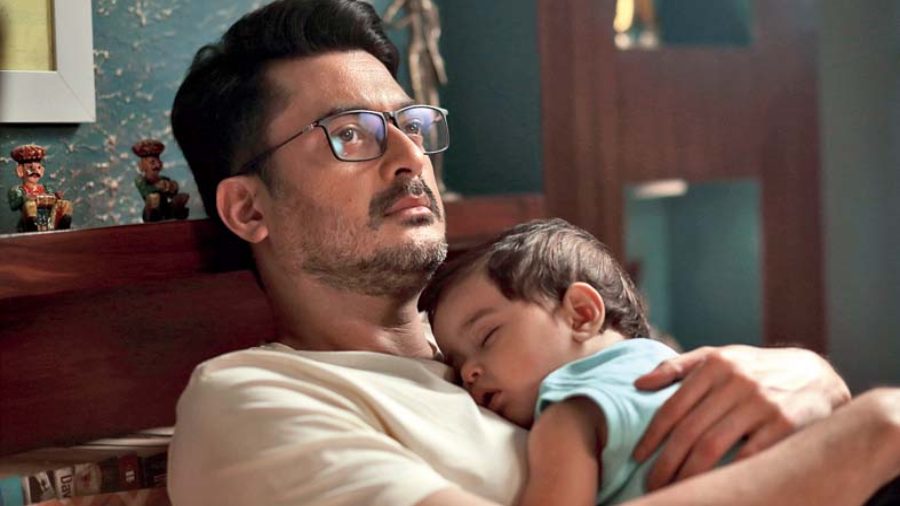After tasting box-office success with his directorial debut Brahma Janen Gopon Kommoti, director Aritra Mukherjee is looking forward to the release of his second film Baba, Baby O... “We have collectively been through a very difficult time and are in that healing phase right now. What can heal better than a lot of love and laughter? This film was conceived during lockdown 2020, when all we wanted was an excuse to smile. We nurtured the story within us and were very happy about it. It would give us relief from the difficult times we were in,” says Aritra. The Telegraph chat.
Why did you decide to make a film on surrogacy?
My friend, Zinia, who is the screenplay writer of this film, became an aunt during Lockdown 2020. Her brother, who I know very well, became a single father through surrogacy. The kids, Golu and Molu, were born in Mumbai and travelled all the way to Kolkata in a neo-natal ambulance during such a tough time. I was aware of what was happening on that front. Then, when the kids were all of three months, her entire family was down with Covid. She had to bring the kids to her place and spent a lot of time with them. That’s when she shared with me the one-liner — what if a single father falls in love? I was very excited and was with her through and through as she wrote the screenplay and with Samragnee (Bandopadhyay) as she wrote the dialogues. Fact is, surrogacy is not embraced only by celebs, now common people who want to enjoy parenthood and are not keen on marriage, too are opting for the same. So, this film holds a mirror to society.
How did you go about the research work?
A real incident in our family was the starting point of this story and we came to know about the whats, whens and hows without making a lot of effort. Once the story was written, I went to a surrogacy clinic, met a doctor and gave him a proper narration. I did all the fact-checking as it’s a raging issue right now. Everything shown in the film regarding surrogacy is true. Once the film was ready, I showed it to five doctors who are associated with a surrogacy clinic. They loved what they saw.
Many people may not be aware of the concept and process of surrogacy. Does the film shed light on it?
Of course, the concept of surrogacy has been explained well. And that’s also there in the trailer. But I have not delved deeper into the process, as surrogacy is a small part of this film. Baba, Baby O… is a love story and it is about a man, Megh Roddur Chattopadhyay, who falls in love after becoming a father through surrogacy. But even though the process has not been dealt with in details, there are many myths surrounding surrogacy — the way society looks at it. I have tried to highlight all that through this film.
Did you also deal with the issues of ethics surrounding surrogacy?
I am very much aware of the ongoing debate surrounding commercial surrogacy vs altruistic surrogacy, where no monetary compensation to the surrogate mother is given other than the medical expenses and insurance coverage during pregnancy. My film hints at the latter. Fact is, surrogacy is legal in India and it is turning dreams of parenthood into reality. And it is only the take-off point in the film.

How was it like directing Jisshu?
It was a fantastic experience. I had earlier assisted Nanditadi and Shibuda (Shiboprosad Mukherjee) on Posto, where Jisshuda played the lead. This time around, I got to know him better. Despite being a star, he would spend a lot of time on the set, making fun, easing things up. Since we had four very small child actors in the age brackets of three and six months, the shoot was difficult. We had to wait for them to give us the right expressions. But Jisshuda had asked Subhankar (Bhar) and me to go ahead with the reaction shots of the kids first and to focus on him later. The kids were all very fond of him and would break into smiles every time they saw him. In fact, just having him around made lives easier for all of us.
How was your shooting experience with the babies?
Prior to the shoot, my team and I spent a lot of time with the kids at their respective homes. By the time we started shooting, we already knew when they would go off to sleep or when they would wake up, the hours that they would be active, what they ate, what made them happy et al. So, we designed our shoot days around their active hours and the scenes where they are shown sleeping, were shot when they were actually sleeping. Of course, it was challenging to shoot with them, but it was a lot of fun too. At times, we felt they had some secret training or why else would they be so perfect!
Why the title Baba, Baby O...?
Baba, Baby O… is about a father, his babies and the ‘O’ or the ‘Other’ factor in his life. It’s this ‘O’ that brings all the disruption in his otherwise perfect life.
